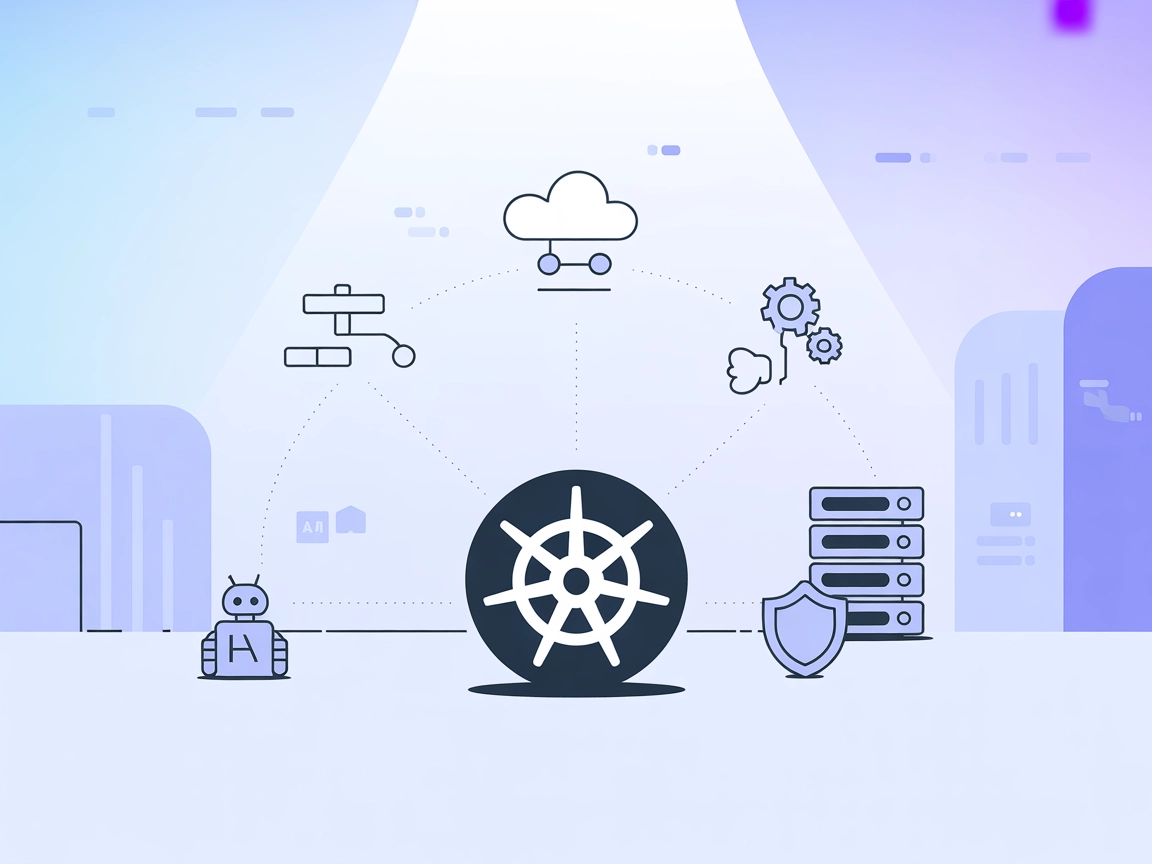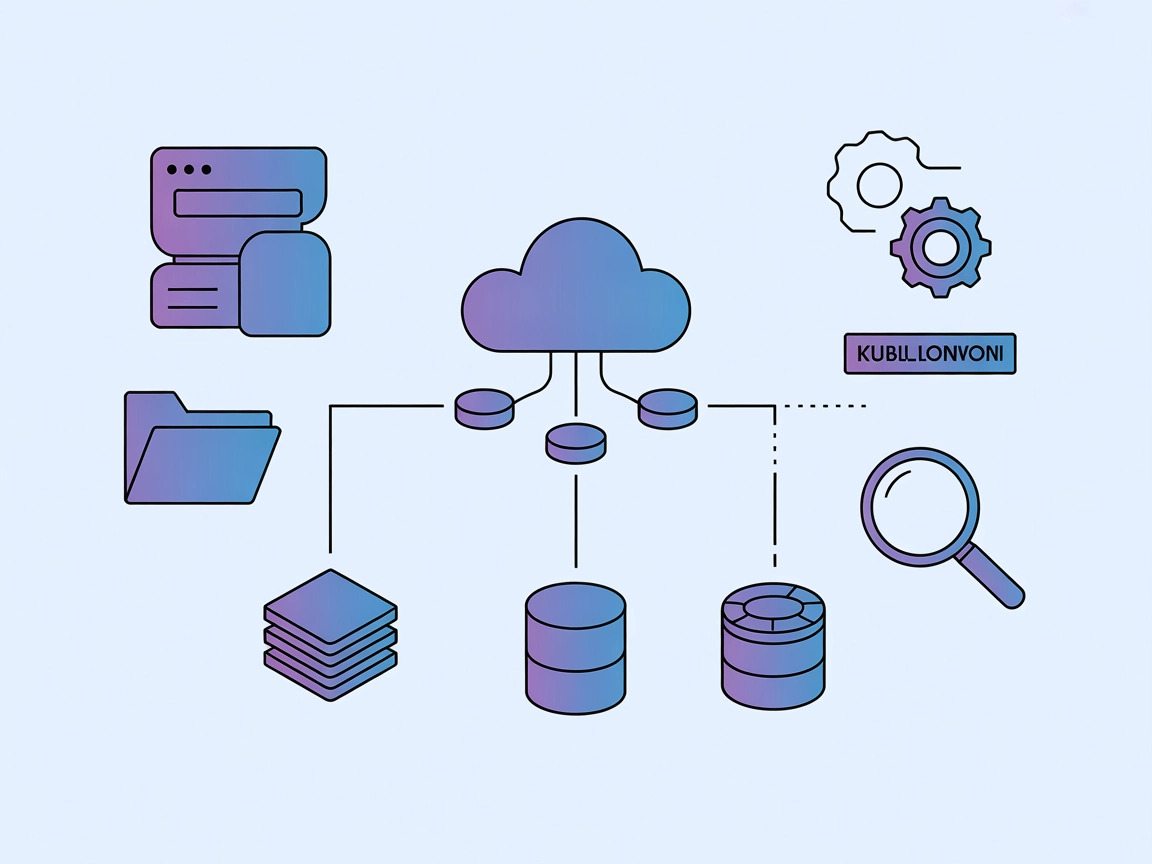
Kubernetes MCP Server Integration
The Kubernetes MCP Server bridges AI assistants and Kubernetes clusters, enabling AI-driven automation, resource management, and DevOps workflows through standa...

Connect AI assistants to Kubernetes clusters securely and efficiently with the mcp-k8s-go server, enabling automation, monitoring, and management of cloud-native resources through a unified MCP interface.
FlowHunt provides an additional security layer between your internal systems and AI tools, giving you granular control over which tools are accessible from your MCP servers. MCP servers hosted in our infrastructure can be seamlessly integrated with FlowHunt's chatbot as well as popular AI platforms like ChatGPT, Claude, and various AI editors.
The mcp-k8s-go MCP Server is a Golang-based implementation of the Model Context Protocol (MCP) designed to connect AI assistants with Kubernetes clusters. It acts as a middleware between AI agents and Kubernetes APIs, allowing AI-driven workflows to interact programmatically with Kubernetes resources. By exposing cluster operations and contextual data, mcp-k8s-go enables tasks such as querying cluster status, managing deployments, inspecting pods, and more—all through a standardized MCP interface. This greatly enhances developer productivity by allowing AI assistants to automate, monitor, and manage Kubernetes environments seamlessly, making cloud-native operations more accessible and efficient.
No prompt templates are mentioned in the available documentation or codebase.
No explicit resources are described in the available documentation or codebase.
No detailed tool definitions are directly exposed in the accessible code or documentation.
windsurf.config.json).mcpServers section:{
"mcpServers": {
"mcp-k8s-go": {
"command": "npx",
"args": ["@strowk/mcp-k8s@latest"]
}
}
}
Securing API Keys
Use environment variables to store sensitive credentials:
{
"mcpServers": {
"mcp-k8s-go": {
"command": "npx",
"args": ["@strowk/mcp-k8s@latest"],
"env": {
"KUBECONFIG": "/path/to/kubeconfig"
}
}
}
}
{
"mcpServers": {
"mcp-k8s-go": {
"command": "npx",
"args": ["@strowk/mcp-k8s@latest"]
}
}
}
Securing API Keys
{
"mcpServers": {
"mcp-k8s-go": {
"command": "npx",
"args": ["@strowk/mcp-k8s@latest"],
"env": {
"KUBECONFIG": "/path/to/kubeconfig"
}
}
}
}
{
"mcpServers": {
"mcp-k8s-go": {
"command": "npx",
"args": ["@strowk/mcp-k8s@latest"]
}
}
}
Securing API Keys
{
"mcpServers": {
"mcp-k8s-go": {
"command": "npx",
"args": ["@strowk/mcp-k8s@latest"],
"env": {
"KUBECONFIG": "/path/to/kubeconfig"
}
}
}
}
{
"mcpServers": {
"mcp-k8s-go": {
"command": "npx",
"args": ["@strowk/mcp-k8s@latest"]
}
}
}
Securing API Keys
{
"mcpServers": {
"mcp-k8s-go": {
"command": "npx",
"args": ["@strowk/mcp-k8s@latest"],
"env": {
"KUBECONFIG": "/path/to/kubeconfig"
}
}
}
}
Using MCP in FlowHunt
To integrate MCP servers into your FlowHunt workflow, start by adding the MCP component to your flow and connecting it to your AI agent:

Click on the MCP component to open the configuration panel. In the system MCP configuration section, insert your MCP server details using this JSON format:
{
"mcp-k8s-go": {
"transport": "streamable_http",
"url": "https://yourmcpserver.example/pathtothemcp/url"
}
}
Once configured, the AI agent is now able to use this MCP as a tool with access to all its functions and capabilities. Remember to change “mcp-k8s-go” to whatever the actual name of your MCP server is and replace the URL with your own MCP server URL.
| Section | Availability | Details/Notes |
|---|---|---|
| Overview | ✅ | |
| List of Prompts | ⛔ | |
| List of Resources | ⛔ | |
| List of Tools | ⛔ | No explicit list found |
| Securing API Keys | ✅ | Via env KUBECONFIG |
| Sampling Support (less important in evaluation) | ⛔ | Not mentioned |
Based on the available information, the mcp-k8s-go MCP server provides a Kubernetes interface via MCP but lacks explicit documentation for prompts, resources, and sampling. The setup and security guidance are clear. I would rate this MCP server a 5/10 for general usability and documentation completeness, primarily due to missing details on MCP-specific resources and tools.
| Has a LICENSE | ✅ (MIT) |
|---|---|
| Has at least one tool | ⛔ |
| Number of Forks | 37 |
| Number of Stars | 308 |
The mcp-k8s-go MCP Server is a Golang-based middleware that connects AI assistants to Kubernetes clusters via the Model Context Protocol, enabling programmatic cluster management, monitoring, and automation.
You can automate Kubernetes operations such as scaling deployments, rolling updates, monitoring pods, and troubleshooting, all by connecting AI-driven workflows through the MCP server.
Store sensitive data such as your kubeconfig path in environment variables, as shown in the setup guides for each client. This ensures secure and controlled access by your MCP server.
No, the current documentation does not mention support for resource sampling or provide prompt templates. The server focuses on exposing Kubernetes operations via MCP.
Add the MCP server details to your FlowHunt flow using the MCP component. Configure the MCP server's transport and URL in the system MCP configuration panel to enable your AI agent to access Kubernetes functions.
Integrate mcp-k8s-go with FlowHunt and empower your AI agents to manage Kubernetes clusters with ease.

The Kubernetes MCP Server bridges AI assistants and Kubernetes clusters, enabling AI-driven automation, resource management, and DevOps workflows through standa...

The Kubernetes MCP Server bridges AI assistants and Kubernetes/OpenShift clusters, enabling programmatic resource management, pod operations, and DevOps automat...

The k8s-multicluster-mcp MCP Server provides seamless, centralized management of multiple Kubernetes clusters via a standardized API, supporting resource operat...